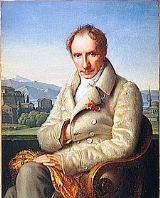
Francois Pouqueville
Encyclopedia
François Charles Hugues Laurent Pouqueville (4 November 1770, in Le Merlerault
, Normandy
, France – 20 December 1838) was a French diplomat, writer, explorer, physician and historian, member of the Institut de France.
First as the Turkish Sultan's hostage, then as Napoleon Bonaparte's general consul at the court of Ali Pasha of Ioannina
, he travelled extensively throughout Ottoman occupied Greece
from 1798 to 1820.
With his far reaching diplomacy and with his writings, he became a prominent architect of the Philhellenism
movement throughout Europe, and contributed eminently to the liberation of the Greeks, and to the rebirth of the Greek Nation.
His innumerable detailed letters to his siblings are still today an exceptional source of knowledge on every aspect of the life of a world traveller, explorer, and diplomat, during the French Revolution
, the Napoleonic Empire, and the Restauration
of the French Monarchy, at the turn of the 19th century.
François Pouqueville studied at the college of Caen
before joining the Lisieux
seminary. He became deacon and was ordained at 21. He then was vicar in his native county of Montmarcé.
Initially known for his convictions as young Royalist minister, he was protected and saved by his own congregation from the cleansing massacres orchestrated against the aristocrats by some uncontrolled revolutionary mobs during the Reign of Terror
period.
However, in these exalting times, like many of the young French aristocrats
, he started supporting the rising democratic movement and, when on 14 July 1793 (year 2 of the French Republic) the primary Assembly of Le Merlerault
adopted the new Constitution, François Pouqueville was its Secretary.
He was assistant to the mayor (1793), then 23 years old and finding his vocation with the events of the French Revolution
, he finally resigned from the clergy to become a teacher (1794), and a municipal assistant at Le Merlereault (1795). He remained a fervent Christian during all his life.
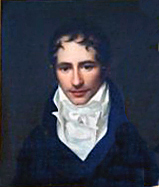 However, his renunciation of the cloth, his strong Republican speeches, and his open criticisms of the Papacy, made him the target this time of the resurgent royalists in Normandy, and he had again to seek refuge in hiding – probably in Caen – until the defeat in Quiberon
However, his renunciation of the cloth, his strong Republican speeches, and his open criticisms of the Papacy, made him the target this time of the resurgent royalists in Normandy, and he had again to seek refuge in hiding – probably in Caen – until the defeat in Quiberon
of the royalist forces joined by the bands of Charette's chouans, destroyed by the Republican army led by Hoche
, as it was done by Bonaparte – nicknamed Captain Canon – at the siege of Toulon
and later in Paris.
When François Pouqueville returned to Le Merlerault, the town's physician, Dr Cochin, who had been his colleague at the college of Caen, took him as student-surgeon. He then introduced him to his friend the professor Antoine Dubois of the Faculty of Medicine in Paris and who was later the Empress Marie-Louise's doctor when she gave birth to Napoleon's only son, Napoleon II in 1811.
François Pouqueville left Le Merlerault for Paris (1797). He was 27.
Under Professor Dubois, he made rapid progress in medicine and surgery, and the following year, when then general Bonaparte
's expedition to Egypt
was decided upon, Pouqueville was one of the surgeons of its accompanying commission of sciences and arts of Egypt
. This turned to be a crucial decision which to considerable degree affected the rest of his life
With dreams of glory and fortune, François Pouqueville embarked in Toulon
with the ill-fated French Fleet under the command of Général Bonaparte as it sailed towards Egypt. On the way, he witnessed the taking of Malta
, and he spent the days of the crossing to Alexandria
teaching the French soldiers and sailors the vibrant lyrics of La Marseillaise
, the new French national anthem.

entrusted François Pouqueville to negotiate the exchange of prisoners with admiral Nelson.
While meeting with the main figures of the British Admiralty, he would quickly develop a great respect for William Sidney Smith
who spoke perfect French and proved to be courteous, human, and a man of honor. Converesely, his encounters with Nelson filled him with repugnance, so brutal and cruel the Admiral proved to be towards the French officers, and from then on, Pouqueville would only mention him under the epithet of "blood-thirsty cyclops
".
His mission accomplished, and having caught a bad fever that restrained him from continuing his scientific researches, François Pouqueville was advised by Kleber to return to France to receive better medical attention.
He boarded the Italian merchant ship La madonna di Montenegro in Alexandria
. She was sailing to Italy and approaching Calabria
when being attacked by Barbary Coast
pirates. François Pouqueville was among those taken prisoner.
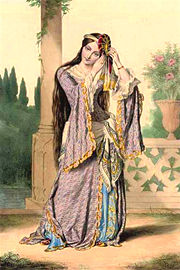 Brought to Navarino
Brought to Navarino
, and then to Tripolitza, capital of Peloponnese
, he was remanded to the custody of the pacha of Morea
, Moustapha, the Ottoman Empire being at war with France.
Moustapha Pacha received him with some indifference, but he still protected him against the brutalities of the Albanian soldiers who were guarding him since his capture, and he gave him a decent lodging.
Soon after, the pacha was deposed and replaced by Achmet Pacha.
Having learned that François Pouqueville practiced medicine, the new pacha treated him well and, after seeing how successful Pouqueville was when healing some members of his entourage, he named him official physician of his pashalic.
Pouqueville took advantage of his new situation by exploring the surrounding regions and by researching the sites of ancient Greece.
He remained in Tripolitza through the harsh 1798 winter.
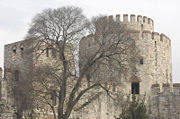 In the spring, the Sultan ordered that he be transferred over land and sea with his co-prisoners to Constantinople
In the spring, the Sultan ordered that he be transferred over land and sea with his co-prisoners to Constantinople
where they were incarcerated for two years in the Fortress of Seven Towers, Yedikule.
François Pouqueville wrote that they found there, living in abject conditions, the members of the French embassy to whom the Sultan had refused, under insistent demands from the British, the usual diplomatic treatment of being kept on parole at the French embassy palace, which had been appropriated by the same British.
Pouqueville tried saving the life the dying Adjutant-general Rose, but it was too late. Rose had been France's representative in Epirus
and had fallen victim of Ali Pasha of Ioannina
's cruel perfidy. A few years later, he would be replaced in Ioannina by Pouqueville himself.
François Pouqueville became friend with the French diplomat Ruffin
, held prisoner since the expedition of Egypt, whose health he attended to, whom he nicknamed the Nestor
of the Orient
and with whom he perfected his knowledge of orientalist
. Later, the two men continued their correspondence long after their release from prison, until Ruffin's death.
Soon after arriving in Constantinople, François Pouqueville gained some liberty of movement, as his jailers had learned about his medical skills.
He succeeded in exploring the surroundings of the fortress, notably the Sultan's private gardens at the Topkapi
palace, and even the garden of his harem
, with the complicity of the Sultan's gardener whom he had befriended.
On occasions, he convinced his guards to let him travel through the City of Constantinople and along the Bosphorus, all the way to the Black Sea
, to attend to other French prisoners who were gravely ill and held in a distant jail.
At the time, the plague was still active in the eastern parts of the Mediterranean regions. Pouqueville was determined in his researches of the proper medical methods to fight the terrible disease. His observations in the form of a thesis were highly regarded, when published in Paris upon his return.
His written accounts of such excursions were the first detailed descriptions by a westerner of the Turkish megalopolis and its diverse inhabitants, their way of life, customs and habits. These were received in Europe with great astonishment and curiosity, for 'The Gate of Asia' had previously remained practically unexplored by westerners since the Fall of Constantinople
in 1453.
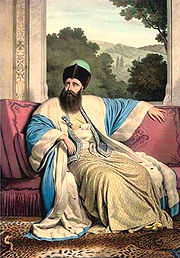 While jailed, Pouqueville studied modern Greek
While jailed, Pouqueville studied modern Greek
. He translated Anacreon
, wrote several oriental pieces like The Pariah, a short humoristic poem, La Gueuseade, in four chants
and in sestet
s, and a few lighter poems dedicated to Rose Ruffin.
Throughout his captivity, Pouqueville kept a journal
written in a secret code
that he had devised and that he managed to hide from his guards, leading them instead in their occasional searches of his cell to other unimportant writings which he let them find and confiscate.
It is from this occult journal that he was able to write, a few years after his release, the 600 pages of the first two parts of the important book he published in 1805 and that brought him fame and fortune, the 300 pages of part three being devoted to the astonishing adventures that his friends and brothers in arms (future Baron, General) Poitevin
, (future General) Charbonnel and (future Consul General) Bessieres
encountered before and after their release from the fortress of seven towers.
 In 1798, as a hostage of the Turks in Ottoman Greece
In 1798, as a hostage of the Turks in Ottoman Greece
, François Pouqueville had an uneasy view of the Greeks he encountered in the close entourage of his Ottoman guards. Not unlike Lord Byron who later, at his death in 1824, also became a symbol of philhellenism, Pouqueville felt at first unsure of the Greeks' sincerity.
However, his work as the pashalic's physician in Tripolitza caused his Turkish escort to become gradually sparser and his frequent contacts with authentic Greeks made him appreciate their rich cultural background under a new light. Even though it was being suppressed by the seven generations long occupation of Greece by their Ottoman rulers, the Greek social identity appeared very much alive to Pouqueville and, as a fervent believer of the French revolution's humanism
, he soon developed a growing sympathy for the budding Greek resurgence.
His condition as a prisoner of the Turkish Sultan prevented him at the time to do more than bringing medical attention and treatment to the oppressed population, but his writings already showed a strong new current of intellectual and emotional support.
His humane survey of Greece as early as 1798 is the 19th century's earliest manifestation of the philhellene movement. His impulse soon spread throughout Europe with the wide publication of his books setting in motion a constant trend amongst the greatest minds of the time to follow his steps across the newly revealed land of Greece.
The antique nation's rebirth ensued over the next decades with its war of independence and its liberation, with the break-up of the Ottoman Empire.
In 1801, twenty five months after being jailed in Constantinople, under the insistence of the French government and with the help from the Russia
n diplomats in Turkey, François Pouqueville was set free and returned to Paris.
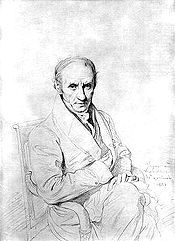 Upon his return to Paris, he submitted his doctorate thesis De febre adeno-nevrosa seu de peste orientali a work on the oriental plague that caused him to be nominated for the awards for the prizes of the decade.
Upon his return to Paris, he submitted his doctorate thesis De febre adeno-nevrosa seu de peste orientali a work on the oriental plague that caused him to be nominated for the awards for the prizes of the decade.
However, his interests for literature and archaeology
were now for Pouqueville as strong as his passion for medicine.
The publication of his first book "Travel to Epirus, to Constantinople, to Albania and to several other parts of the Ottoman Empire", dedicated to the Emperor Napoleon I
and published in 1805, was a huge literary success internationally and had also for consequence his nomination as Napoleon's consul general to the court of Ali Pasha
of Ioannina
.
His knowledge of the region and of the local languages made him the ideal diplomatic agent for Napoleon and his foreign minister Talleyrand.
Pouqueville accepted the post that would also enable him to pursue his studies about Greece.
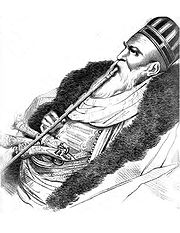 At first, he was welcomed by the famous pasha whom he accompanied to several of his excursions and who made him discover his native Albania
At first, he was welcomed by the famous pasha whom he accompanied to several of his excursions and who made him discover his native Albania
.
For a time he also took with him the British agent Leake
in several travels of archaeological surveys across Greece. Together they reported many forgotten or previously unknown antique sites.
His diplomatic status also enabled Pouqueville to explore Greece in its entirety as far as Macedonia
and Thrace
.
He maintained his journal containing the details of the observations and discoveries he made in the course of a great number of explorations covering all of Greece and the Balkans during his 15 years of diplomatic tenure in Ioannina
and in Patras
.
In 1811, joined by his brother Hugues who had also been named consul in Greece, they researched and recorded the remains of no less than sixty five antique cities in Epirus
alone.
In 1813, he discovered in Actium
a stone slab with Acarnanian inscriptions which he deciphered. It pertained to the time when the Roman armies appeared in Greece (c. 197 BC) and was a decree of the Senate and of the people of Acarnania
proclaiming the brothers Publius and Lucius Acilius
as their friends and benefactors.
In Ioannina, the court of Ali Pasha was increasingly the seat of many political intrigues between the European powers encouraged by the pasha himself, and Pouqueville was for years the target of disparaging and acrimonious critics from some English visitors to Ioannina such as Lord Byron with Hobhouse
, and Cockerell
, as they allowed themselves to be corrupted by the depraved lifestyle of the Court of Ioannina when Pouqueville instead demonstrated rectitude and firmness against Ali Pasha's criminal abuses of power.
Moreover, the literary and political notoriety he had acquired with the international success of his first book, dedicated to Emperor Napoléon, and singling him out as the precursor, as early as 1805, of the Greek revival movement emerging in Europe, was evidently a cause for resentment on the part of the English.
However, after his visit to Ioannina, the distinguished Reverend T.S. Hugues wrote that he (unlike Byron and Hobhouse) "found him very polite, generous and humane, and thought him a scholar and man of the world, nor did that contest in which our respective countries were engaged, in the slightest degree repress his hospitality and attentions – an instance of good manners which would be surprising in the hate-ridden world of today."
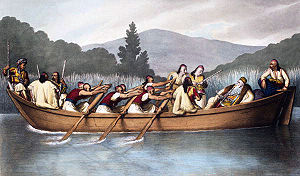 (1825)]]
(1825)]]
Hpwever, after Napoleon's 1807 treaty of Tilsitt which forewarned of the dismantling of the Ottoman Empire, Ali Pasha renounced his alliance with France and yielded to Britain's complaisance.
Pouqueville's frequent Philhellene positions and his constant opposition to Ali's devilish rule made Pouqueville's situation progressively more and more dangerous; and, after Pouqueville had ordered French troops to join the Greeks of Parga
in their successful defence against Ali's murderous hordes, he often had to remain in his house lest Ali Pasha would have him assassinated too.
Thereafter, whenever he had an official communication for Ali, his brother Hugues, himself French consul in nearby Arta http://www.greeklandscapes.com/greece/arta.html, had to bring it for him to the pasha whose atrocities he also witnessed throughout Epirus http://books.google.fr/books?id=kM8GAAAAQAAJ&printsec=titlepage&source=gbs_summary_r&cad=0#PPA467,M1.
In his memoirs, François Pouqueville concluded: " It was in this manner that the Turks, through their own excesses, prepared and fomented the Greek insurrection."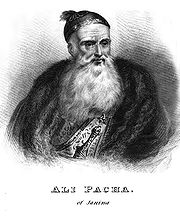 Finally, against Britain's continuous attempts to maintain and reinforce the Turks' brutal oppression of the Greeks, the brothers Pouqueville's consistent diplomatic skills succeeded in achieving the desired chasm between the Sultan and Ali Pacha, thus provoking the beginning of the dismantlement of the Ottoman Empire that would enable the regeneration of free Greek nationalism.
Finally, against Britain's continuous attempts to maintain and reinforce the Turks' brutal oppression of the Greeks, the brothers Pouqueville's consistent diplomatic skills succeeded in achieving the desired chasm between the Sultan and Ali Pacha, thus provoking the beginning of the dismantlement of the Ottoman Empire that would enable the regeneration of free Greek nationalism.
Soon, Ali Pacha would be disposed of by the Turkish emissaries from Constantinople and his severed head brought back to the Sultan.
With remarkable foresight due to his perfect knowledge of the region and its people, François Pouqueville already predicted the recurrent troubles that will henceforth divide the Balkans during the course of modern History: "I will tell how Ali Tebelen Veli Zade – Ali Pasha – after having created for himself one of these horrible reputations that will resound in the future, fell from power leaving to Epirus, his homeland, the fateful inheritance of anarchy, unfathomable damages to the dynasty of Ottman, the hope of freedom for the Greeks, and perhaps extended causes of conflict for Europe.
." (Histoire de la régénération de la Grèce, tome I, chap 1er)
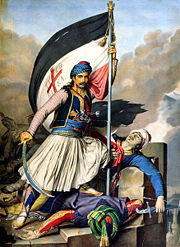 After Napoleon's abdication in 1815, François Pouqueville left Ioannina and was sent as French consul to Patras
After Napoleon's abdication in 1815, François Pouqueville left Ioannina and was sent as French consul to Patras
until 1816, soon followed by his brother Hugues Pouqueville who replaced him as Consul.
They pursued their increasing contacts with the growing movement of the Greek rebellion which culminated with the declaration of the Greek War of Independence
proclaimed on 25 March 1821 in the Agios Georgios chapel in Patras
.
Unlike the British consul Green who refused to help the Greeks and collaborated with the Turks, the French consul Hugues Pouqueville gave shelter to many refugees of any side in the French consulate while the Turkish repression was raging.
His reports described later these events and the extent of the destructions which he qualified as horrible.(In his memoirs, Duke Pasquier
, Chancellor
of France, (1767–1862) wrote: "All the Greeks who were unable to escape from Patras were mercilessly slaughtered, regardless of sex or age. Only a few of the unfortunate victims could find refuge in the house of the consul of France, Mr Pouqueville. He saved them at the peril of his own life. This was the first example of the courageous self-sacrifice with which the French consuls fulfilled their duties.")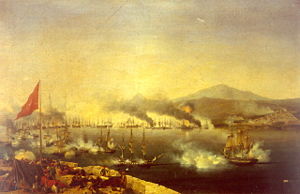 In the end, the foreign legations who had been supportive of the Greeks had to leave the country, and Pouqueville returned to France.
In the end, the foreign legations who had been supportive of the Greeks had to leave the country, and Pouqueville returned to France.
While enjoying a well-deserved retirement from international diplomacy, François Pouqueville saw his support to the Greek war of independence resulting in the French navy taking part in the Battle of Navarino
on 20 October 1827, a naval victory which sealed the end of the 360 years of Turkish occupation of Greece, and in 1828, in the expulsion by the French troops of the Turkish garrison that had been holding on to the Patras citadel
.
It was on these shores of Navarino where, 30 years before, François Pouqueville had been put in chains to be emprisonned by the Turks and where he took his very first steps on Greek land.
As to the pirate Orouchs who had seized him and sold him as a slave, his own fate was that he later went boasting about his capture to Ali Pasha when Pouqueville was still in residence in Ioanina.
First, he had been well rewarded with one of Ali's ship command, but later, and although Pouqueville had granted him his pardon, the pasha found an excuse to have the pirate impaled
.
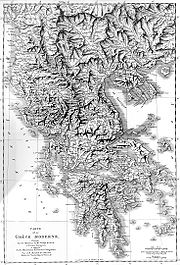
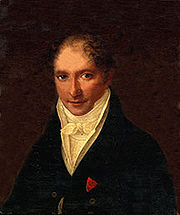 Upon his return to France, François Pouqueville was awarded his seat at the Academie des Insciptions et Belles Lettres
Upon his return to France, François Pouqueville was awarded his seat at the Academie des Insciptions et Belles Lettres
.
He was elected member of the Institut d'Égypte
, honorary member of the Paris' Academy of Medicine
, associate member of the Royal Academy of Marseille
, member of the Ionian Academy
of Corcyre http://www.ionio.gr/central/en/history, member of the Society of Sciences of Bonn
, and Knight of the Legion of Honor.
All along, he described the daily life, the usages and customs, and the traditions of the Greeks of the Peloponese surviving under their appalling economic and political conditions.
His observations became a powerful support for the cause of the Greek rebellion and its dramatic events which he reported faithfully in substantial books that were quickly published and translated in several languages.
They had a considerable influence throughout Europe as it was gained by the ideas of the French Revolution
.
His books also gave a precise and detailed description of the geography
, archaeology
, topography
, and geology of the areas he traveled through and visited, and his observations were highly regarded by later explorers and by the geographer
Jean-Denis Barbié du Bocage, author of a fine atlas attached to Barthelemy's
Voyage du jeune Anarcharsis en Grèce dans le milieu du quatrième siècle avant l'ère vulgaire, and who was a founder of the Societe de geographie
in 1821.
The maps of Greece that were established through their collaboration, and that of topographer Pierre Lapie with the publication of Pouqueville's "Voyage de la Grèce" (1824), were so detailed and complete that they remained in use in Greece until the advent of aerial photography
, and even to this day
For his services to their Country the Greeks honored him with the award of the Order of the Savior.
"To M. Pouqueville" were the dedications by prominent French poet Casimir Delavigne
of two of his Messeiennes, odes to the combats for freedom.
The epitaph
engraved in the marble of François Pouqueville's grave proclaims, in French and in Greek:
"With his writings he contributed powerfully to the return of their antique nationality to the oppressed Greeks"
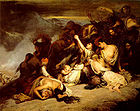 He became part of the Parisian gentry and was a regular at many salons
He became part of the Parisian gentry and was a regular at many salons
such as Countess of Ségur's who portrayed him under the affectionate humoristic character of Monsieur Tocambel in one of her best sellers Quel amour d'enfant!.
He befriended many of the time's artists and intellectuals such as Chateaubriand whom he inspired and guided, as early as 1805, in visiting Greece and Egypt, and physicists Arago
and Ampère
, and also Alexandre Dumas who paid him homage in the book he wrote about Ali Pasha.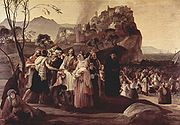
The chapter he wrote about the massacre of the Souliots perpetrated by Ali Pacha in 1804 and published in his book History of Greece's regeneration (1824) inspired playwright Népomucène Lemercier
to write "The martyrs of Souli or the modern Epirus" a tragedy in five acts (Paris, 1825), and romantic painter Ary Scheffer
to paint "The Souliot women" (1827).
His writings on the outrages inflicted upon the inhabitants of Parga
when the city was abandoned by the British to Ali Pacha's cruelty in 1818 also inspired a major painting by Italian romantic painter Francesco Hayez
(1791–1882).
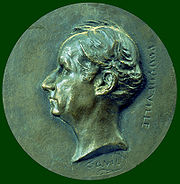
François Pouqueville's life companion was the popular painter-portraitist Henriette Lorimier
.
Master painter Ingres who was one of their friends also made his portrait in 1834.
Having saved so many human lives, François Pouqueville, aged 68, died peacefully at their residence of 3, rue de l'Abbaye in Paris.
His grave at the Montparnasse cemetery is ornamented with his effigy
by one of his closest friends, the sculptor David d'Angers.
Le Merlerault
Le Merlerault is a commune in the Orne department in north-western France.-Heraldry:...
, Normandy
Normandy
Normandy is a geographical region corresponding to the former Duchy of Normandy. It is in France.The continental territory covers 30,627 km² and forms the preponderant part of Normandy and roughly 5% of the territory of France. It is divided for administrative purposes into two régions:...
, France – 20 December 1838) was a French diplomat, writer, explorer, physician and historian, member of the Institut de France.
First as the Turkish Sultan's hostage, then as Napoleon Bonaparte's general consul at the court of Ali Pasha of Ioannina
Ioannina
Ioannina , often called Jannena within Greece, is the largest city of Epirus, north-western Greece, with a population of 70,203 . It lies at an elevation of approximately 500 meters above sea level, on the western shore of lake Pamvotis . It is located within the Ioannina municipality, and is the...
, he travelled extensively throughout Ottoman occupied Greece
Ottoman Greece
Most of Greece gradually became part of the Ottoman Empire from the 15th century until its declaration of independence in 1821, a historical period also known as Tourkokratia ....
from 1798 to 1820.
With his far reaching diplomacy and with his writings, he became a prominent architect of the Philhellenism
Philhellenism
Philhellenism was an intellectual fashion prominent at the turn of the 19th century, that led Europeans like Lord Byron or Charles Nicolas Fabvier to advocate for Greek independence from the Ottoman Empire...
movement throughout Europe, and contributed eminently to the liberation of the Greeks, and to the rebirth of the Greek Nation.
Youth: Minister and revolutionary
From a young age, his uncommon talent as a writer reveals itself. He began a life-long correspondence with his younger brother, Hugues, and their dear sister, Adèle, the three remaining very close throughout their lives.His innumerable detailed letters to his siblings are still today an exceptional source of knowledge on every aspect of the life of a world traveller, explorer, and diplomat, during the French Revolution
French Revolution
The French Revolution , sometimes distinguished as the 'Great French Revolution' , was a period of radical social and political upheaval in France and Europe. The absolute monarchy that had ruled France for centuries collapsed in three years...
, the Napoleonic Empire, and the Restauration
Bourbon Restoration
The Bourbon Restoration is the name given to the period following the successive events of the French Revolution , the end of the First Republic , and then the forcible end of the First French Empire under Napoleon – when a coalition of European powers restored by arms the monarchy to the...
of the French Monarchy, at the turn of the 19th century.
François Pouqueville studied at the college of Caen
Caen
Caen is a commune in northwestern France. It is the prefecture of the Calvados department and the capital of the Basse-Normandie region. It is located inland from the English Channel....
before joining the Lisieux
Lisieux
Lisieux is a commune in the Calvados department in the Basse-Normandie region in northwestern France.Lisieux is the capital of the Pays d'Auge area, which is characterised by valleys and hedged farmland...
seminary. He became deacon and was ordained at 21. He then was vicar in his native county of Montmarcé.

Initially known for his convictions as young Royalist minister, he was protected and saved by his own congregation from the cleansing massacres orchestrated against the aristocrats by some uncontrolled revolutionary mobs during the Reign of Terror
Reign of Terror
The Reign of Terror , also known simply as The Terror , was a period of violence that occurred after the onset of the French Revolution, incited by conflict between rival political factions, the Girondins and the Jacobins, and marked by mass executions of "enemies of...
period.
However, in these exalting times, like many of the young French aristocrats
Aristocracy (class)
The aristocracy are people considered to be in the highest social class in a society which has or once had a political system of Aristocracy. Aristocrats possess hereditary titles granted by a monarch, which once granted them feudal or legal privileges, or deriving, as in Ancient Greece and India,...
, he started supporting the rising democratic movement and, when on 14 July 1793 (year 2 of the French Republic) the primary Assembly of Le Merlerault
Le Merlerault
Le Merlerault is a commune in the Orne department in north-western France.-Heraldry:...
adopted the new Constitution, François Pouqueville was its Secretary.
He was assistant to the mayor (1793), then 23 years old and finding his vocation with the events of the French Revolution
French Revolution
The French Revolution , sometimes distinguished as the 'Great French Revolution' , was a period of radical social and political upheaval in France and Europe. The absolute monarchy that had ruled France for centuries collapsed in three years...
, he finally resigned from the clergy to become a teacher (1794), and a municipal assistant at Le Merlereault (1795). He remained a fervent Christian during all his life.

Quiberon
Quiberon is a commune in the Morbihan department in Brittany in north-western France.It is situated on the southern part of the Quiberon peninsula, the northern part being the commune of Saint-Pierre-Quiberon...
of the royalist forces joined by the bands of Charette's chouans, destroyed by the Republican army led by Hoche
Lazare Hoche
Louis Lazare Hoche was a French soldier who rose to be general of the Revolutionary army.Born of poor parents near Versailles, he enlisted at sixteen as a private soldier in the Gardes Françaises...
, as it was done by Bonaparte – nicknamed Captain Canon – at the siege of Toulon
Siege of Toulon
The Siege of Toulon was an early Republican victory over a Royalist rebellion in the Southern French city of Toulon. It is also often known as the Fall of Toulon.-Context:...
and later in Paris.
When François Pouqueville returned to Le Merlerault, the town's physician, Dr Cochin, who had been his colleague at the college of Caen, took him as student-surgeon. He then introduced him to his friend the professor Antoine Dubois of the Faculty of Medicine in Paris and who was later the Empress Marie-Louise's doctor when she gave birth to Napoleon's only son, Napoleon II in 1811.
François Pouqueville left Le Merlerault for Paris (1797). He was 27.
Under Professor Dubois, he made rapid progress in medicine and surgery, and the following year, when then general Bonaparte
Bonaparte
The House of Bonaparte is an imperial and royal European dynasty founded by Napoleon I of France in 1804, a French military leader who rose to notability out of the French Revolution and transformed the French Republic into the First French Empire within five years of his coup d'état...
's expedition to Egypt
Egypt
Egypt , officially the Arab Republic of Egypt, Arabic: , is a country mainly in North Africa, with the Sinai Peninsula forming a land bridge in Southwest Asia. Egypt is thus a transcontinental country, and a major power in Africa, the Mediterranean Basin, the Middle East and the Muslim world...
was decided upon, Pouqueville was one of the surgeons of its accompanying commission of sciences and arts of Egypt
Description de l'Egypte (1809)
The Description de l'Égypte was a series of publications, appearing first in 1809 and continuing until the final volume appeared in 1829, which offered a comprehensive scientific description of ancient and modern Egypt as well as its natural history...
. This turned to be a crucial decision which to considerable degree affected the rest of his life
With dreams of glory and fortune, François Pouqueville embarked in Toulon
Toulon
Toulon is a town in southern France and a large military harbor on the Mediterranean coast, with a major French naval base. Located in the Provence-Alpes-Côte-d'Azur region, Toulon is the capital of the Var department in the former province of Provence....
with the ill-fated French Fleet under the command of Général Bonaparte as it sailed towards Egypt. On the way, he witnessed the taking of Malta
Malta
Malta , officially known as the Republic of Malta , is a Southern European country consisting of an archipelago situated in the centre of the Mediterranean, south of Sicily, east of Tunisia and north of Libya, with Gibraltar to the west and Alexandria to the east.Malta covers just over in...
, and he spent the days of the crossing to Alexandria
Alexandria
Alexandria is the second-largest city of Egypt, with a population of 4.1 million, extending about along the coast of the Mediterranean Sea in the north central part of the country; it is also the largest city lying directly on the Mediterranean coast. It is Egypt's largest seaport, serving...
teaching the French soldiers and sailors the vibrant lyrics of La Marseillaise
La Marseillaise
"La Marseillaise" is the national anthem of France. The song, originally titled "Chant de guerre pour l'Armée du Rhin" was written and composed by Claude Joseph Rouget de Lisle in 1792. The French National Convention adopted it as the Republic's anthem in 1795...
, the new French national anthem.

Egypt: Bonaparte, Nelson and pirates
In Egypt, after the first battle of Aboukir (1798), general KleberKléber
Kléber may refer to:* Jean Baptiste Kléber , a French general* Kléber de Carvalho Corrêa , a Brazilian football player* Kléber de Souza Freitas , a Brazilian football player...
entrusted François Pouqueville to negotiate the exchange of prisoners with admiral Nelson.
While meeting with the main figures of the British Admiralty, he would quickly develop a great respect for William Sidney Smith
Sidney Smith (admiral)
Admiral Sir William Sidney Smith, KCB, GCTE was a British naval officer. Serving in the American and French revolutionary wars, he later rose to the rank of admiral....
who spoke perfect French and proved to be courteous, human, and a man of honor. Converesely, his encounters with Nelson filled him with repugnance, so brutal and cruel the Admiral proved to be towards the French officers, and from then on, Pouqueville would only mention him under the epithet of "blood-thirsty cyclops
Cyclops
A cyclops , in Greek mythology and later Roman mythology, was a member of a primordial race of giants, each with a single eye in the middle of his forehead...
".
His mission accomplished, and having caught a bad fever that restrained him from continuing his scientific researches, François Pouqueville was advised by Kleber to return to France to receive better medical attention.
He boarded the Italian merchant ship La madonna di Montenegro in Alexandria
Alexandria
Alexandria is the second-largest city of Egypt, with a population of 4.1 million, extending about along the coast of the Mediterranean Sea in the north central part of the country; it is also the largest city lying directly on the Mediterranean coast. It is Egypt's largest seaport, serving...
. She was sailing to Italy and approaching Calabria
Calabria
Calabria , in antiquity known as Bruttium, is a region in southern Italy, south of Naples, located at the "toe" of the Italian Peninsula. The capital city of Calabria is Catanzaro....
when being attacked by Barbary Coast
Barbary Coast
The Barbary Coast, or Barbary, was the term used by Europeans from the 16th until the 19th century to refer to much of the collective land of the Berber people. Today, the terms Maghreb and "Tamazgha" correspond roughly to "Barbary"...
pirates. François Pouqueville was among those taken prisoner.
Peloponese: Pasha and physician

Pylos
Pylos , historically known under its Italian name Navarino, is a town and a former municipality in Messenia, Peloponnese, Greece. Since the 2011 local government reform it is part of the municipality Pylos-Nestoras, of which it is the seat and a municipal unit. It was the capital of the former...
, and then to Tripolitza, capital of Peloponnese
Peloponnese
The Peloponnese, Peloponnesos or Peloponnesus , is a large peninsula , located in a region of southern Greece, forming the part of the country south of the Gulf of Corinth...
, he was remanded to the custody of the pacha of Morea
Morea
The Morea was the name of the Peloponnese peninsula in southern Greece during the Middle Ages and the early modern period. It also referred to a Byzantine province in the region, known as the Despotate of Morea.-Origins of the name:...
, Moustapha, the Ottoman Empire being at war with France.
Moustapha Pacha received him with some indifference, but he still protected him against the brutalities of the Albanian soldiers who were guarding him since his capture, and he gave him a decent lodging.
Soon after, the pacha was deposed and replaced by Achmet Pacha.
Having learned that François Pouqueville practiced medicine, the new pacha treated him well and, after seeing how successful Pouqueville was when healing some members of his entourage, he named him official physician of his pashalic.
Pouqueville took advantage of his new situation by exploring the surrounding regions and by researching the sites of ancient Greece.
He remained in Tripolitza through the harsh 1798 winter.
Constantinople: prisons and harems

Constantinople
Constantinople was the capital of the Roman, Eastern Roman, Byzantine, Latin, and Ottoman Empires. Throughout most of the Middle Ages, Constantinople was Europe's largest and wealthiest city.-Names:...
where they were incarcerated for two years in the Fortress of Seven Towers, Yedikule.
François Pouqueville wrote that they found there, living in abject conditions, the members of the French embassy to whom the Sultan had refused, under insistent demands from the British, the usual diplomatic treatment of being kept on parole at the French embassy palace, which had been appropriated by the same British.
Pouqueville tried saving the life the dying Adjutant-general Rose, but it was too late. Rose had been France's representative in Epirus
Epirus
The name Epirus, from the Greek "Ήπειρος" meaning continent may refer to:-Geographical:* Epirus - a historical and geographical region of the southwestern Balkans, straddling modern Greece and Albania...
and had fallen victim of Ali Pasha of Ioannina
Ioannina
Ioannina , often called Jannena within Greece, is the largest city of Epirus, north-western Greece, with a population of 70,203 . It lies at an elevation of approximately 500 meters above sea level, on the western shore of lake Pamvotis . It is located within the Ioannina municipality, and is the...
's cruel perfidy. A few years later, he would be replaced in Ioannina by Pouqueville himself.
François Pouqueville became friend with the French diplomat Ruffin
Ruffin
-Family name:*Bruce Ruffin - Reggae singer*David Ruffin - American singer, one of the lead singers with The Temptations*Edmund Ruffin - Agricultural writer and Confederate independence firebrand*François Amable Ruffin - French general...
, held prisoner since the expedition of Egypt, whose health he attended to, whom he nicknamed the Nestor
Nestor (mythology)
In Greek mythology, Nestor of Gerenia was the son of Neleus and Chloris and the King of Pylos. He became king after Heracles killed Neleus and all of Nestor's siblings...
of the Orient
Orient
The Orient means "the East." It is a traditional designation for anything that belongs to the Eastern world or the Far East, in relation to Europe. In English it is a metonym that means various parts of Asia.- Derivation :...
and with whom he perfected his knowledge of orientalist
Oriental studies
Oriental studies is the academic field of study that embraces Near Eastern and Far Eastern societies and cultures, languages, peoples, history and archaeology; in recent years the subject has often been turned into the newer terms of Asian studies and Middle Eastern studies...
. Later, the two men continued their correspondence long after their release from prison, until Ruffin's death.
Soon after arriving in Constantinople, François Pouqueville gained some liberty of movement, as his jailers had learned about his medical skills.
He succeeded in exploring the surroundings of the fortress, notably the Sultan's private gardens at the Topkapi
Topkapi Palace
The Topkapı Palace is a large palace in Istanbul, Turkey, that was the primary residence of the Ottoman Sultans for approximately 400 years of their 624-year reign....
palace, and even the garden of his harem
Harem
Harem refers to the sphere of women in what is usually a polygynous household and their enclosed quarters which are forbidden to men...
, with the complicity of the Sultan's gardener whom he had befriended.
On occasions, he convinced his guards to let him travel through the City of Constantinople and along the Bosphorus, all the way to the Black Sea
Black Sea
The Black Sea is bounded by Europe, Anatolia and the Caucasus and is ultimately connected to the Atlantic Ocean via the Mediterranean and the Aegean seas and various straits. The Bosphorus strait connects it to the Sea of Marmara, and the strait of the Dardanelles connects that sea to the Aegean...
, to attend to other French prisoners who were gravely ill and held in a distant jail.
At the time, the plague was still active in the eastern parts of the Mediterranean regions. Pouqueville was determined in his researches of the proper medical methods to fight the terrible disease. His observations in the form of a thesis were highly regarded, when published in Paris upon his return.
His written accounts of such excursions were the first detailed descriptions by a westerner of the Turkish megalopolis and its diverse inhabitants, their way of life, customs and habits. These were received in Europe with great astonishment and curiosity, for 'The Gate of Asia' had previously remained practically unexplored by westerners since the Fall of Constantinople
Fall of Constantinople
The Fall of Constantinople was the capture of the capital of the Byzantine Empire, which occurred after a siege by the Ottoman Empire, under the command of Ottoman Sultan Mehmed II, against the defending army commanded by Byzantine Emperor Constantine XI...
in 1453.

Modern Greek
Modern Greek refers to the varieties of the Greek language spoken in the modern era. The beginning of the "modern" period of the language is often symbolically assigned to the fall of the Byzantine Empire in 1453, even though that date marks no clear linguistic boundary and many characteristic...
. He translated Anacreon
Anacreon
Anacreon was a Greek lyric poet, notable for his drinking songs and hymns. Later Greeks included him in the canonical list of nine lyric poets.- Life :...
, wrote several oriental pieces like The Pariah, a short humoristic poem, La Gueuseade, in four chants
Gallican chant
Gallican chant refers to the liturgical plainchant repertory of the Gallican rite of the Roman Catholic Church in Gaul, prior to the introduction and development of elements of the Roman rite from which Gregorian chant evolved...
and in sestet
Sestet
A sestet is the name given to the second division of an Italian sonnet , which must consist of an octave, of eight lines, succeeded by a sestet, of six lines. The first documented user of this poetical form was the Italian poet, Petrarch. In the usual course the rhymes are arranged abc abc, but...
s, and a few lighter poems dedicated to Rose Ruffin.
Throughout his captivity, Pouqueville kept a journal
Diary
A diary is a record with discrete entries arranged by date reporting on what has happened over the course of a day or other period. A personal diary may include a person's experiences, and/or thoughts or feelings, including comment on current events outside the writer's direct experience. Someone...
written in a secret code
Secret Code
Secret Code is the debut major album of artist Aya Kamiki, released on July 12, 2006. It comes in a CD only version. Secret Code debuted at number 5 on the Oricon Weekly Charts for Japan and sold 65,004 copies in total...
that he had devised and that he managed to hide from his guards, leading them instead in their occasional searches of his cell to other unimportant writings which he let them find and confiscate.
It is from this occult journal that he was able to write, a few years after his release, the 600 pages of the first two parts of the important book he published in 1805 and that brought him fame and fortune, the 300 pages of part three being devoted to the astonishing adventures that his friends and brothers in arms (future Baron, General) Poitevin
Poitevin
Poitevin may refer to:* From or related to Poitou or to the town of Poitiers * Poitevin , the language spoken in the Poitou* Poitevin horse, a breed of draught horse from Poitou, France* Poitevin , a breed of dog...
, (future General) Charbonnel and (future Consul General) Bessieres
Bessières
Bessières can refer to:* Bessières, Haute-Garonne* Jean-Baptiste Bessières, French marshal, duke of Istria * his younger brother, Bertrand, Baron Bessieres...
encountered before and after their release from the fortress of seven towers.
Taking part in the emergence of Philhellenism

Ottoman Greece
Most of Greece gradually became part of the Ottoman Empire from the 15th century until its declaration of independence in 1821, a historical period also known as Tourkokratia ....
, François Pouqueville had an uneasy view of the Greeks he encountered in the close entourage of his Ottoman guards. Not unlike Lord Byron who later, at his death in 1824, also became a symbol of philhellenism, Pouqueville felt at first unsure of the Greeks' sincerity.
However, his work as the pashalic's physician in Tripolitza caused his Turkish escort to become gradually sparser and his frequent contacts with authentic Greeks made him appreciate their rich cultural background under a new light. Even though it was being suppressed by the seven generations long occupation of Greece by their Ottoman rulers, the Greek social identity appeared very much alive to Pouqueville and, as a fervent believer of the French revolution's humanism
Humanism
Humanism is an approach in study, philosophy, world view or practice that focuses on human values and concerns. In philosophy and social science, humanism is a perspective which affirms some notion of human nature, and is contrasted with anti-humanism....
, he soon developed a growing sympathy for the budding Greek resurgence.
His condition as a prisoner of the Turkish Sultan prevented him at the time to do more than bringing medical attention and treatment to the oppressed population, but his writings already showed a strong new current of intellectual and emotional support.
His humane survey of Greece as early as 1798 is the 19th century's earliest manifestation of the philhellene movement. His impulse soon spread throughout Europe with the wide publication of his books setting in motion a constant trend amongst the greatest minds of the time to follow his steps across the newly revealed land of Greece.
The antique nation's rebirth ensued over the next decades with its war of independence and its liberation, with the break-up of the Ottoman Empire.
In 1801, twenty five months after being jailed in Constantinople, under the insistence of the French government and with the help from the Russia
Russia
Russia or , officially known as both Russia and the Russian Federation , is a country in northern Eurasia. It is a federal semi-presidential republic, comprising 83 federal subjects...
n diplomats in Turkey, François Pouqueville was set free and returned to Paris.
Diplomat and archaeologist

However, his interests for literature and archaeology
Archaeology
Archaeology, or archeology , is the study of human society, primarily through the recovery and analysis of the material culture and environmental data that they have left behind, which includes artifacts, architecture, biofacts and cultural landscapes...
were now for Pouqueville as strong as his passion for medicine.
The publication of his first book "Travel to Epirus, to Constantinople, to Albania and to several other parts of the Ottoman Empire", dedicated to the Emperor Napoleon I
Napoleon I
Napoleon Bonaparte was a French military and political leader during the latter stages of the French Revolution.As Napoleon I, he was Emperor of the French from 1804 to 1815...
and published in 1805, was a huge literary success internationally and had also for consequence his nomination as Napoleon's consul general to the court of Ali Pasha
Ali Pasha
Ali Pasha of Tepelena or of Yannina, surnamed Aslan, "the Lion", or the "Lion of Yannina", Ali Pashë Tepelena was an Ottoman Albanian ruler of the western part of Rumelia, the Ottoman Empire's European territory which was also called Pashalik of Yanina. His court was in Ioannina...
of Ioannina
Ioannina
Ioannina , often called Jannena within Greece, is the largest city of Epirus, north-western Greece, with a population of 70,203 . It lies at an elevation of approximately 500 meters above sea level, on the western shore of lake Pamvotis . It is located within the Ioannina municipality, and is the...
.
His knowledge of the region and of the local languages made him the ideal diplomatic agent for Napoleon and his foreign minister Talleyrand.
Pouqueville accepted the post that would also enable him to pursue his studies about Greece.
Increasing conflict with Ali Pasha of Ioannina

Albania
Albania , officially known as the Republic of Albania , is a country in Southeastern Europe, in the Balkans region. It is bordered by Montenegro to the northwest, Kosovo to the northeast, the Republic of Macedonia to the east and Greece to the south and southeast. It has a coast on the Adriatic Sea...
.
For a time he also took with him the British agent Leake
William Martin Leake
William Martin Leake, FRS , British antiquarian and topographer, was born in London.After completing his education at the Royal Military Academy, Woolwich, and spending four years in the West Indies as lieutenant of marine artillery, he was sent by the government to Constantinople to instruct the...
in several travels of archaeological surveys across Greece. Together they reported many forgotten or previously unknown antique sites.
His diplomatic status also enabled Pouqueville to explore Greece in its entirety as far as Macedonia
Macedonia (region)
Macedonia is a geographical and historical region of the Balkan peninsula in southeastern Europe. Its boundaries have changed considerably over time, but nowadays the region is considered to include parts of five Balkan countries: Greece, the Republic of Macedonia, Bulgaria, Albania, Serbia, as...
and Thrace
Thrace
Thrace is a historical and geographic area in southeast Europe. As a geographical concept, Thrace designates a region bounded by the Balkan Mountains on the north, Rhodope Mountains and the Aegean Sea on the south, and by the Black Sea and the Sea of Marmara on the east...
.
He maintained his journal containing the details of the observations and discoveries he made in the course of a great number of explorations covering all of Greece and the Balkans during his 15 years of diplomatic tenure in Ioannina
Ioannina
Ioannina , often called Jannena within Greece, is the largest city of Epirus, north-western Greece, with a population of 70,203 . It lies at an elevation of approximately 500 meters above sea level, on the western shore of lake Pamvotis . It is located within the Ioannina municipality, and is the...
and in Patras
Patras
Patras , ) is Greece's third largest urban area and the regional capital of West Greece, located in northern Peloponnese, 215 kilometers west of Athens...
.
In 1811, joined by his brother Hugues who had also been named consul in Greece, they researched and recorded the remains of no less than sixty five antique cities in Epirus
Epirus
The name Epirus, from the Greek "Ήπειρος" meaning continent may refer to:-Geographical:* Epirus - a historical and geographical region of the southwestern Balkans, straddling modern Greece and Albania...
alone.
In 1813, he discovered in Actium
Actium
Actium was the ancient name of a promontory of western Greece in northwestern Acarnania, at the mouth of the Sinus Ambracius opposite Nicopolis, built by Augustus on the north side of the strait....
a stone slab with Acarnanian inscriptions which he deciphered. It pertained to the time when the Roman armies appeared in Greece (c. 197 BC) and was a decree of the Senate and of the people of Acarnania
Acarnania
Acarnania is a region of west-central Greece that lies along the Ionian Sea, west of Aetolia, with the Achelous River for a boundary, and north of the gulf of Calydon, which is the entrance to the Gulf of Corinth. Today it forms the western part of the prefecture of Aetolia-Acarnania. The capital...
proclaiming the brothers Publius and Lucius Acilius
Manius Acilius Glabrio (consul 191 BC)
Manius Acilius Glabrio was a consul of the Roman Republic in 191 BC. He came from an illustrious plebeian family whose members held magistracies throughout the Republic and into the Imperial era....
as their friends and benefactors.
In Ioannina, the court of Ali Pasha was increasingly the seat of many political intrigues between the European powers encouraged by the pasha himself, and Pouqueville was for years the target of disparaging and acrimonious critics from some English visitors to Ioannina such as Lord Byron with Hobhouse
John Hobhouse, 1st Baron Broughton
John Cam Hobhouse, 1st Baron Broughton GCB, PC, FRS , known as Sir John Hobhouse, Bt, from 1831 to 1851, was a British politician and memoirist.-Background and education:...
, and Cockerell
Charles Robert Cockerell
Charles Robert Cockerell was an English architect, archaeologist, and writer.-Life:Charles Robert Cockerell was educated at Westminster School from 1802. From the age of sixteen, he trained in the architectural practice of his father, Samuel Pepys Cockerell...
, as they allowed themselves to be corrupted by the depraved lifestyle of the Court of Ioannina when Pouqueville instead demonstrated rectitude and firmness against Ali Pasha's criminal abuses of power.
Moreover, the literary and political notoriety he had acquired with the international success of his first book, dedicated to Emperor Napoléon, and singling him out as the precursor, as early as 1805, of the Greek revival movement emerging in Europe, was evidently a cause for resentment on the part of the English.
However, after his visit to Ioannina, the distinguished Reverend T.S. Hugues wrote that he (unlike Byron and Hobhouse) "found him very polite, generous and humane, and thought him a scholar and man of the world, nor did that contest in which our respective countries were engaged, in the slightest degree repress his hospitality and attentions – an instance of good manners which would be surprising in the hate-ridden world of today."

Hpwever, after Napoleon's 1807 treaty of Tilsitt which forewarned of the dismantling of the Ottoman Empire, Ali Pasha renounced his alliance with France and yielded to Britain's complaisance.
Pouqueville's frequent Philhellene positions and his constant opposition to Ali's devilish rule made Pouqueville's situation progressively more and more dangerous; and, after Pouqueville had ordered French troops to join the Greeks of Parga
Parga
Parga, , is a town and municipality located in the northwestern part of the regional unit of Preveza in Epirus, northwestern Greece. The seat of the municipality is the village Kanallaki. Parga lies on the Ionian coast between the cities of Preveza and Igoumenitsa...
in their successful defence against Ali's murderous hordes, he often had to remain in his house lest Ali Pasha would have him assassinated too.
Thereafter, whenever he had an official communication for Ali, his brother Hugues, himself French consul in nearby Arta http://www.greeklandscapes.com/greece/arta.html, had to bring it for him to the pasha whose atrocities he also witnessed throughout Epirus http://books.google.fr/books?id=kM8GAAAAQAAJ&printsec=titlepage&source=gbs_summary_r&cad=0#PPA467,M1.
In his memoirs, François Pouqueville concluded: " It was in this manner that the Turks, through their own excesses, prepared and fomented the Greek insurrection."

Soon, Ali Pacha would be disposed of by the Turkish emissaries from Constantinople and his severed head brought back to the Sultan.
With remarkable foresight due to his perfect knowledge of the region and its people, François Pouqueville already predicted the recurrent troubles that will henceforth divide the Balkans during the course of modern History: "I will tell how Ali Tebelen Veli Zade – Ali Pasha – after having created for himself one of these horrible reputations that will resound in the future, fell from power leaving to Epirus, his homeland, the fateful inheritance of anarchy, unfathomable damages to the dynasty of Ottman, the hope of freedom for the Greeks, and perhaps extended causes of conflict for Europe.
." (Histoire de la régénération de la Grèce, tome I, chap 1er)
Patras and the Greek War of Independence

Patras
Patras , ) is Greece's third largest urban area and the regional capital of West Greece, located in northern Peloponnese, 215 kilometers west of Athens...
until 1816, soon followed by his brother Hugues Pouqueville who replaced him as Consul.
They pursued their increasing contacts with the growing movement of the Greek rebellion which culminated with the declaration of the Greek War of Independence
Greek War of Independence
The Greek War of Independence, also known as the Greek Revolution was a successful war of independence waged by the Greek revolutionaries between...
proclaimed on 25 March 1821 in the Agios Georgios chapel in Patras
History of Patras
The city of Patras has an important history of four thousand years. Patras has been inhabited since the prehistoric age and constituted an important centre of the Mycenean era. In the antiquity it was a leading member of the Achaean League. Patras reached the peak of its power in the Roman era,...
.
Unlike the British consul Green who refused to help the Greeks and collaborated with the Turks, the French consul Hugues Pouqueville gave shelter to many refugees of any side in the French consulate while the Turkish repression was raging.
His reports described later these events and the extent of the destructions which he qualified as horrible.(In his memoirs, Duke Pasquier
Étienne-Denis Pasquier
Étienne-Denis, duc de Pasquier , Chancelier de France, , was a French statesman...
, Chancellor
Chancellor
Chancellor is the title of various official positions in the governments of many nations. The original chancellors were the Cancellarii of Roman courts of justice—ushers who sat at the cancelli or lattice work screens of a basilica or law court, which separated the judge and counsel from the...
of France, (1767–1862) wrote: "All the Greeks who were unable to escape from Patras were mercilessly slaughtered, regardless of sex or age. Only a few of the unfortunate victims could find refuge in the house of the consul of France, Mr Pouqueville. He saved them at the peril of his own life. This was the first example of the courageous self-sacrifice with which the French consuls fulfilled their duties.")

While enjoying a well-deserved retirement from international diplomacy, François Pouqueville saw his support to the Greek war of independence resulting in the French navy taking part in the Battle of Navarino
Battle of Navarino
The naval Battle of Navarino was fought on 20 October 1827, during the Greek War of Independence in Navarino Bay , on the west coast of the Peloponnese peninsula, in the Ionian Sea. A combined Ottoman and Egyptian armada was destroyed by a combined British, French and Russian naval force...
on 20 October 1827, a naval victory which sealed the end of the 360 years of Turkish occupation of Greece, and in 1828, in the expulsion by the French troops of the Turkish garrison that had been holding on to the Patras citadel
History of Patras
The city of Patras has an important history of four thousand years. Patras has been inhabited since the prehistoric age and constituted an important centre of the Mycenean era. In the antiquity it was a leading member of the Achaean League. Patras reached the peak of its power in the Roman era,...
.
It was on these shores of Navarino where, 30 years before, François Pouqueville had been put in chains to be emprisonned by the Turks and where he took his very first steps on Greek land.
As to the pirate Orouchs who had seized him and sold him as a slave, his own fate was that he later went boasting about his capture to Ali Pasha when Pouqueville was still in residence in Ioanina.
First, he had been well rewarded with one of Ali's ship command, but later, and although Pouqueville had granted him his pardon, the pasha found an excuse to have the pirate impaled
Impalement
Impalement is the traumatic penetration of an organism by an elongated foreign object such as a stake, pole, or spear, and this usually implies complete perforation of the central mass of the impaled body...
.
Return to Parisian life

Honors

Académie des Inscriptions et Belles-Lettres
The Académie des Inscriptions et Belles-Lettres is a French learned society devoted to the humanities, founded in February 1663 as one of the five academies of the Institut de France.-History:...
.
He was elected member of the Institut d'Égypte
Description de l'Egypte
Description de l'Égypte is the title of several books.* Description de l'Égypte - Description de l'Égypte ou Recueil des observations et des recherches qui ont été faites en Égypte pendant l'expédition de l'armée française Pub; First Edition , L'Imprimerie Imperiale, 1809-1813; l'Imprimerie...
, honorary member of the Paris' Academy of Medicine
Académie Nationale de Médecine
Académie Nationale de Médecine, or National Academy of Medicine was created in 1820 by king Louis XVIII at the urging of baron Antoine Portal. At its inception, the institution was known as the Académie Royale de Médecine...
, associate member of the Royal Academy of Marseille
Marseille
Marseille , known in antiquity as Massalia , is the second largest city in France, after Paris, with a population of 852,395 within its administrative limits on a land area of . The urban area of Marseille extends beyond the city limits with a population of over 1,420,000 on an area of...
, member of the Ionian Academy
Ionian Academy
The Ionian Academy was the first Greek academic institution established in modern times and it is located in Corfu. It was established by Frederick North, 5th Earl of Guilford in 1824. It is also considered the precursor of the Ionian University. It had Philological, Law and Medical Schools.The...
of Corcyre http://www.ionio.gr/central/en/history, member of the Society of Sciences of Bonn
Bonn
Bonn is the 19th largest city in Germany. Located in the Cologne/Bonn Region, about 25 kilometres south of Cologne on the river Rhine in the State of North Rhine-Westphalia, it was the capital of West Germany from 1949 to 1990 and the official seat of government of united Germany from 1990 to 1999....
, and Knight of the Legion of Honor.
Writer of the regeneration of Greece
While writing about antique Greece in the numerous major works and articles he published from this moment, François Pouqueville mostly applied himself in denouncing the state of oppression crushing the Greeks under Turkish domination, and more specifically stood as witness of "the crimes and abominations perpetrated by Ali Pacha and his bands of assassins with the complicity of the Turkish Sultan and his allies".All along, he described the daily life, the usages and customs, and the traditions of the Greeks of the Peloponese surviving under their appalling economic and political conditions.
His observations became a powerful support for the cause of the Greek rebellion and its dramatic events which he reported faithfully in substantial books that were quickly published and translated in several languages.
They had a considerable influence throughout Europe as it was gained by the ideas of the French Revolution
French Revolution
The French Revolution , sometimes distinguished as the 'Great French Revolution' , was a period of radical social and political upheaval in France and Europe. The absolute monarchy that had ruled France for centuries collapsed in three years...
.
His books also gave a precise and detailed description of the geography
Geography
Geography is the science that studies the lands, features, inhabitants, and phenomena of Earth. A literal translation would be "to describe or write about the Earth". The first person to use the word "geography" was Eratosthenes...
, archaeology
Archaeology
Archaeology, or archeology , is the study of human society, primarily through the recovery and analysis of the material culture and environmental data that they have left behind, which includes artifacts, architecture, biofacts and cultural landscapes...
, topography
Topography
Topography is the study of Earth's surface shape and features or those ofplanets, moons, and asteroids...
, and geology of the areas he traveled through and visited, and his observations were highly regarded by later explorers and by the geographer
Geographer
A geographer is a scholar whose area of study is geography, the study of Earth's natural environment and human society.Although geographers are historically known as people who make maps, map making is actually the field of study of cartography, a subset of geography...
Jean-Denis Barbié du Bocage, author of a fine atlas attached to Barthelemy's
Jean-Jacques Barthélemy
Jean-Jacques Barthélemy was a French writer and numismatist.-Early life:Barthélemy was born at Cassis, in Provence, and began his classical studies at the College of Oratory in Marseilles. He took up philosophy and theology at the Jesuits' college, and finally attended the seminary of the Lazarists...
Voyage du jeune Anarcharsis en Grèce dans le milieu du quatrième siècle avant l'ère vulgaire, and who was a founder of the Societe de geographie
Société de Géographie
The Société de Géographie , is the world's oldest geographical society. It was founded in 1821 . Since 1878, its headquarters has been at 184 Boulevard Saint-Germain, Paris. The entrance is marked by two gigantic caryatids representing Land and Sea...
in 1821.
The maps of Greece that were established through their collaboration, and that of topographer Pierre Lapie with the publication of Pouqueville's "Voyage de la Grèce" (1824), were so detailed and complete that they remained in use in Greece until the advent of aerial photography
Aerial photography
Aerial photography is the taking of photographs of the ground from an elevated position. The term usually refers to images in which the camera is not supported by a ground-based structure. Cameras may be hand held or mounted, and photographs may be taken by a photographer, triggered remotely or...
, and even to this day
For his services to their Country the Greeks honored him with the award of the Order of the Savior.
"To M. Pouqueville" were the dedications by prominent French poet Casimir Delavigne
Casimir Delavigne
Jean-François Casimir Delavigne was a French poet and dramatist.-Biography:Delavigne was born at Le Havre, but was sent to Paris to be educated at the Lycée Napoleon. He read extensively...
of two of his Messeiennes, odes to the combats for freedom.
The epitaph
Epitaph
An epitaph is a short text honoring a deceased person, strictly speaking that is inscribed on their tombstone or plaque, but also used figuratively. Some are specified by the dead person beforehand, others chosen by those responsible for the burial...
engraved in the marble of François Pouqueville's grave proclaims, in French and in Greek:
"With his writings he contributed powerfully to the return of their antique nationality to the oppressed Greeks"
Intellectual and artistic social life

Salon (gathering)
A salon is a gathering of people under the roof of an inspiring host, held partly to amuse one another and partly to refine taste and increase their knowledge of the participants through conversation. These gatherings often consciously followed Horace's definition of the aims of poetry, "either to...
such as Countess of Ségur's who portrayed him under the affectionate humoristic character of Monsieur Tocambel in one of her best sellers Quel amour d'enfant!.
He befriended many of the time's artists and intellectuals such as Chateaubriand whom he inspired and guided, as early as 1805, in visiting Greece and Egypt, and physicists Arago
François Arago
François Jean Dominique Arago , known simply as François Arago , was a French mathematician, physicist, astronomer and politician.-Early life and work:...
and Ampère
André-Marie Ampère
André-Marie Ampère was a French physicist and mathematician who is generally regarded as one of the main discoverers of electromagnetism. The SI unit of measurement of electric current, the ampere, is named after him....
, and also Alexandre Dumas who paid him homage in the book he wrote about Ali Pasha.

The chapter he wrote about the massacre of the Souliots perpetrated by Ali Pacha in 1804 and published in his book History of Greece's regeneration (1824) inspired playwright Népomucène Lemercier
Népomucène Lemercier
Louis Jean Népomucène Lemercier was a French poet and dramatist.He was born in Paris. His father had been intendant successively to the duc de Penthièvre, the comte de Toulouse and the unfortunate princesse de Lamballe, who was the boy's godmother...
to write "The martyrs of Souli or the modern Epirus" a tragedy in five acts (Paris, 1825), and romantic painter Ary Scheffer
Ary Scheffer
Ary Scheffer , French painter of Dutch and German extraction, was born in Dordrecht.-Life:After the early death of his father Johann Baptist, a poor painter, Ary's mother Cornelia, herself a painter and daughter of landscapist Arie Lamme, took him to Paris and placed him in the studio of...
to paint "The Souliot women" (1827).
His writings on the outrages inflicted upon the inhabitants of Parga
Parga
Parga, , is a town and municipality located in the northwestern part of the regional unit of Preveza in Epirus, northwestern Greece. The seat of the municipality is the village Kanallaki. Parga lies on the Ionian coast between the cities of Preveza and Igoumenitsa...
when the city was abandoned by the British to Ali Pacha's cruelty in 1818 also inspired a major painting by Italian romantic painter Francesco Hayez
Francesco Hayez
Francesco Hayez was an Italian painter, the leading artist of Romanticism in mid-19th-century Milan, renowned for his grand historical paintings, political allegories and exceptionally fine portraits.-Biography:...
(1791–1882).

François Pouqueville's life companion was the popular painter-portraitist Henriette Lorimier
Henriette Lorimier
Elisabeth Henriette Marthe Lorimier was a popular portraitist in Paris at the beginning of Romanticism.She lived with the French diplomat and philhellene writer Francois Pouqueville ....
.
Master painter Ingres who was one of their friends also made his portrait in 1834.
Having saved so many human lives, François Pouqueville, aged 68, died peacefully at their residence of 3, rue de l'Abbaye in Paris.
His grave at the Montparnasse cemetery is ornamented with his effigy
Effigy
An effigy is a representation of a person, especially in the form of sculpture or some other three-dimensional form.The term is usually associated with full-length figures of a deceased person depicted in stone or wood on church monuments. These most often lie supine with hands together in prayer,...
by one of his closest friends, the sculptor David d'Angers.
Works
- Voyage en Morée, à Constantinople, en Albanie, et dans plusieurs autres parties de l'Empire Ottoman (Paris, 1805, 3 vol. in-8°), translated in English, German, Greek, Italian, Swedish, etc. available on line at Gallica
- Travels in Epirus, Albania, Macedonia, and Thessaly (London: Printed for Sir Richard Phillips and Co, 1820), an English denatured and truncated edition available on line
- Prisonnier ches les Turcs & Le Tigre de Janina Romans et Aventures Célèbres – Edition Illustrée – La Librairie Illustrée, Paris 8 c. 1820
- Voyage en Grèce (Paris, 1820–1822, 5 vol. in-8° ; 20 édit., 1826–1827, 6 vol. in-8°), his capital work
- Histoire de la régénération de la Grèce (Paris, 1824, 4 vol. in-8°), translated in many languages. French original edition available on Google books http://books.google.fr/books?id=kM8GAAAAQAAJ&printsec=titlepage&source=gbs_summary_r&cad=0#PPP9,M1
- Mémoire historique et diplomatique sur le commerce et les établissements français au Levant, depuis l'an 500 jusqu’à la fin du XVII siècle, (Paris, 1833, in-8°)
- La Grèce, dans l'Univers pittoresque (1835, in-8°) available on line at Gallica
- Trois Mémoires sur l'IllyrieIllyriaIn classical antiquity, Illyria was a region in the western part of the Balkan Peninsula inhabited by the Illyrians....
- Mémoire sur les colonies valaques établies dans les montagnes de la Grèce, depuis Fienne jusque dans la Morée
- Notice sur la fin tragique d'Ali-Tébélen (1822, in-8°)
External links
- Works by and about François Pouqueville at Internet ArchiveInternet ArchiveThe Internet Archive is a non-profit digital library with the stated mission of "universal access to all knowledge". It offers permanent storage and access to collections of digitized materials, including websites, music, moving images, and nearly 3 million public domain books. The Internet Archive...

